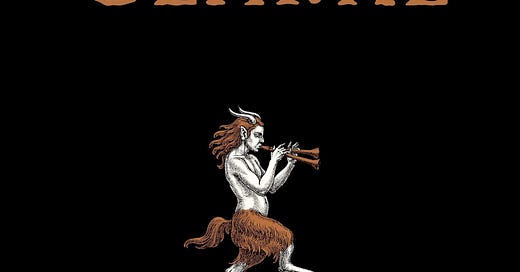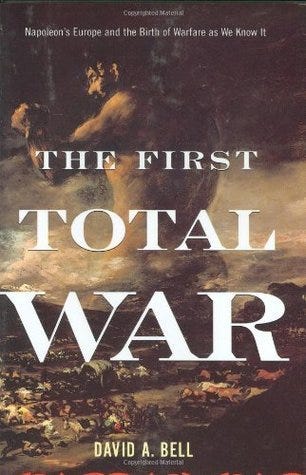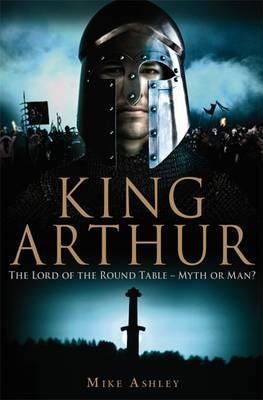Short Reviews for February 2024
The First Total War, Brief History of King Arthur, First Battle of Morn, Piranesi
The First Total War, by David A. Bell (420 pp; 2007)
Who should read this? People interested in the ideas floating around the French Revolution.
The first total war, in Bell's telling, was the French Revolutionary Wars, including the Napoleonic Wars but starting well before his rise to power. Bell cites both action and rhetoric, but emphasizes the role of ideology. Total war, he observes, is inherently a fuzzy concept. What matters is the role of ideas and self-conception; Bell argues that the best way of thinking of "total war" is that it is a war which encompasses the whole of society.
So, Bell cites the changing idea of society in the early French Republic, where each action of the nation was now seen as not just the concern of the king and nobles but of the whole people. One apocalyptic war, the propagandists argued, was needed to annihilate the enemies of the Republic and bring in a worldwide Age of Reason. This led to unprecedented rhetoric where everyone in France was urged to anger against the enemies of the people, and unprecedented mass conscription where every able-bodied man was seen as a potential soldier (in theory, though it wasn't put into practice on that scale). After France did this, the wars started routinely involving previously-rare violence.
And, almost all other powers of Europe were forced to adopt these new ideas and practices to a significant degree. That was one large part of how powers like Prussia and Austria were able to come back from being defeated by Napoleon to help defeat him in turn.
I'm not totally convinced by Bell's argument this is the birth of total war. He's shown quite ably that the French Revolution did birth something new (at least immediately new). This shouldn't be surprising; it showcased many ideas that helped bring about the modern era. But he hasn't shown this transition is more significant than others. The French Revolutionaries invited all society to participate in the war, but how many people took up that offer? Did war change their life in a similar degree to how it changed (say) the life of civilians in World War I? Bell doesn't explore this.
But still, this's an interesting book on some ideas unleashed by the French Revolution; I'm glad I read it.
A Brief History of King Arthur, by Mike Ashley (362 pp; 2010)
Who should read this? People interested in the historical King Arthur.
This's a book digging into a gap in history: who was the historical King Arthur? Ashley presents his search, digging into the different ancient records and stories, and then presenting and defending his own theory.
His theory is that the Arthur mythos is a blend of stories about several different kings. The first "Arthur" who defeated the Saxons at the Battle of Mount Badon and brought a generation of peace, he argues (after establishing that there must have been such a person), had taken the name "Arthur" as a title meaning "High King"; later Arthurs - who appear solidly in historical records - were named after him and the growing legend, several of whom added to the legend.
I was surprised by several of the sources Ashley used; I hadn't heard that the fifth- and sixth-century British kingdoms had complete enough king lists to be used in investigations like this. were reliable enough to use here. I'm also surprised by his parsing Geoffrey of Monmouth's "History" for actual historical information behind it; I'd seen one similar book doing that before, but I'd been convinced that everyone else regarded it as completely legendary (rather than only ~75% legend, like Ashley does.)
Even so, I'm not totally convinced by Ashley's argument. His thesis rests on the fact that any historical Arthur must be a king or closely related to a king, and thus must appear in the king lists. (And thus, he argues, the Arthur of Badon must be listed under a different name.) But Ashley hasn't convinced me that he would have if he were merely a relative. That said, this's a very defensible thesis, and a very able investigation into a variety of sources with good cross-referencing.
The First Battle of Morn, by Deborah Moulton (178 pp; 1988)
Who should read this? People who like vivid images and don't mind tired tropes.
I enjoyed this middle-grade dystopia sci-fi novel as a teenager, but unfortunately it doesn't hold up when I reread it now.
The images remain very evocative: winged horses that occasionally give birth to feared lizards; ancient all-consuming worms who've laid eggs not like themselves that promise a better tomorrow; an underground forest lit by suns repeating the real sun's rays; the leaders of this dystopic colony planet metamorphizing into spiders thanks to gene-splicing... I could go on and on.
But the characters and plot are now very shallow. It's a classic oft-told tale of a young protagonist fleeing the evil dystopic ruling class, being taken in by rebels, and returning to overthrow the rulers. There're more than enough images and references here for a good story, but the story actually told barely scratches the surface. It doesn't add any unique twists to the plot, outside those evocative images. Nor does it add good characters - in fact, I can barely think of two dimensions to our protagonist or anyone else. I remember that, as a teen, I appreciated having so much lore here deeper than the story - and I still think that's a good thing, but not when it's just because the story is so shallow!
That said, the images of the winged horses and all-consuming worms are still sticking into my mind. Perhaps I'll do something with them someday.
Piranesi, by Susanna Clarke (272 pp; 2020)
Who should read this? People who love evocative images and enjoyed the ending of Clarke's last novel.
By contrast, this story does have deep lore and a worthy plot!
We open in a mysterious never-ending house with oceans and tides and appearing gifts and evocative statues and skeletons of past explorers, and a protagonist who remembers nothing else. Where does this come from? How does this relate to the outside? That is to be revealed in the course of the unfolding mystery of the story.
Things move slowly at the beginning here, but the world has more than enough wonders to hold interest until more things are revealed and spur our protagonist to action. The solution to the mystery, when it comes, isn't fascinating in terms of plot - but it opens up weird vistas in the world.
This is a very different book than the author's previous Jonathan Strange and Mr. Norrell, but when I look, I can detect some similarities. More specifically, the similarities are in the ending - we don't get the pseudoscholarly footnotes, but we get the weird wonder we see in the Raven King at the end. My sister compared this to Charles Williams' novels - and I'm forced to agree those're the closest similarities.








What'd you think of "Jonathan Strange and Mr. Norrell"? I heard over and over that it was a classic, and then I read it, and I was profoundly disappointed. I'm sure in part that my expectations were too high, but also it felt like Clarke spent so much effort on the setting, that she basically forgot to spend any time on the plot, which was neither gripping nor especially memorable.